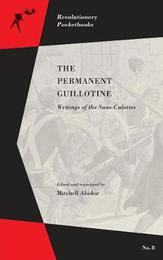
|
The Permanent Guillotine: Writings of the Sans-Culottes
Paperback / softback
Main Details
| Title |
The Permanent Guillotine: Writings of the Sans-Culottes
|
| Authors and Contributors |
Edited by Mitchell Abidor
|
| Physical Properties |
| Format:Paperback / softback | | Pages:160 | | Dimensions(mm): Height 203,Width 127 |
|
| Category/Genre | History |
|---|
| ISBN/Barcode |
9781629633886
|
| Audience | |
|---|
|
Publishing Details |
| Publisher |
PM Press
|
| Imprint |
PM Press
|
| Publication Date |
1 August 2017 |
| Publication Country |
United States
|
Description
When the Bastille was stormed on July 14, 1789, it wasn't a crowd of breeches-wearing professionals that attacked the prison, freed the internees, and killed its superintendent, carrying off his head on a pike. It was the working people of Paris, who didn't wear breeches, the sans-culottes. In the course of the French Revolution the sans-culottes questioned the economic system, the nature of property, the role and even the legitimacy of religion, and for the first time placed class relations at the heart of a revolutionary upheaval. They did so in an often-inchoate fashion, but they were new players on the stage of history, and the Revolution constituted their learning curve. The Permanent Guillotine is an anthology of figures who expressed the will and wishes of this nascent revolutionary class, in all its rage, directness, and contradictoriness. Taken together, these documents provide a full portrait of the left of the left of the Revolution, of the men whose destruction by Robespierre allowed for Robespierre himself to be destroyed and for all the progressive measures they advocated and he implemented to be rolled back. The Revolution they made was ultimately stolen from them, but their attempt was a fertile one, as their ideas flourished in the actions of generations of French revolutionaries.
Author Biography
Mitchell Abidor is the principal French translator for the Marxists Internet Archive and has published several collections of his translations.
Reviews"This valuable collection offers a glimpse of the radical edges of the French Revolution, and of the popular anger and resolve that alone made it possible." Peter Hallward, professor, Modern European Philosophy, Kingston University"
|